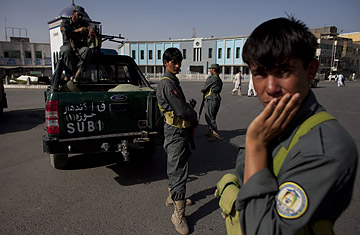
Afghan policemen at a checkpoint in Kandahar, Afghanistan
President Obama's plain-speaking Defense Secretary, Robert Gates, on Nov. 12 summed up the Administration's Afghan dilemma in a single question: "How do we signal resolve and at the same time signal to the Afghans and the American people that this is not open-ended?" The fact that there's no good answer explains the Administration's hesitation in committing more troops to the fight. Indeed, the objectives cited by Gates may function at cross-purposes.
Signaling America's resolve to prevail is essential, as Gates notes, because as long as Afghans and others in the region believe the U.S. military's presence in Afghanistan is finite, they'll hedge their bets. And hedged bets right now work in the Taliban's favor because, as General Stanley McChrystal has warned, it is the insurgents who have the momentum.
The Taliban knows that time is the indispensable ally of the indigenous insurgent facing a foreign army. Its forces were scattered during the U.S. invasion in late 2001 and only began to reassert themselves almost four years later. Yet today they effectively control vast and growing swaths of territory, making it extremely difficult for the U.S. to turn the civilian population into reliable allies. Given the limits of U.S. control on the ground and the expectation that, sooner or later, like the Russians, the Americans will leave, many ordinary Afghans see little incentive to risk their lives in supporting the U.S. mission.
The calculations of ordinary Afghans could change, of course, if they believed the U.S. was there to stay and had the will and capability to prevail. But, as Gates also notes, the U.S. military is not in Afghanistan to stay, and Obama is under growing domestic political pressure to find an exit strategy from a costly war whose importance to U.S. national security has grown murky.
The simple answer to the Administration's dilemma, in the minds of many in Washington, is to train and equip Afghans to do the job themselves. Obama reportedly rejected all four options offered by his national-security staff on Nov. 11 — ranging from a relatively light increase of some 10,000 troops, mostly for training purposes, to the 40,000 reinforcements requested by McChrystal to wage a counterinsurgency fight — because they failed to make clear how and when responsibility for the war would be transferred to Afghan forces. By doing so, Obama may have pointed to the elephant in the room. On present indications, the Afghan forces are unlikely anytime in the near future to be ready and willing to take over the fight against the Taliban.
The Afghan National Army (ANA) comprises some 94,000 troops, although even by the official numbers, only half of those are combat-ready. The reality of the recent U.S. and British operations in Helmand province, however, suggests that a lot fewer may be capable of being deployed to fight effectively alongside NATO forces, much less on their own. The desertion rate of troops trained in the ANA stands at 20% — and is reportedly even higher among forces deployed in combat. Afghan field officers are in short supply, and the top echelon of the officer corps is dominated by ethnic Tajiks who are often viewed with suspicion by Pashtuns, the country's largest ethnic group and the one in which the Taliban is based. And the recent killing of five British soldiers by an Afghan policeman they had been mentoring, who then ran off to join the Taliban, highlights the risk of infiltration in efforts to expand the Afghan security forces.
The Karzai government's poor standing among the Afghan people is generally acknowledged as a problem in that not many Afghans are going to be willing to risk their lives to defend it. Karzai is as aware as his people of the limits of control on the ground by NATO forces and the certainty that they'll leave at some point. And so he has been protecting his interests by making deals with some pretty unsavory characters who wield real power on the ground — and that often requires turning a blind eye to corruption and other transgressions. Washington is looking to turn up the heat on Karzai to crack down on corruption by making clear that its commitment to Afghanistan is finite. Yet if Karzai took the threat of a U.S. pull-out seriously, it could make him even more reliant on ties with unsavory protectors.
Even if Karzai did a more effective job of governing, it's far from clear how many Afghans would be willing to fight their fellow Afghans in the Taliban. While poverty and corruption at the local level certainly fuel the resentment on which the Taliban capitalizes, it is not a protest movement against bad governance as much an insurgency rooted in Islamic and nationalist identities that challenges a political order installed and defended by foreign armies.
Rather than allowing himself to be drawn blindly into a quagmire, Obama is insisting on a clear-eyed view of the prospects for success and ultimately, withdrawal. And that's likely to confirm that even pursuing the most limited kind of success in Afghanistan might require an expanded troop commitment that goes well beyond the next U.S. presidential election.
